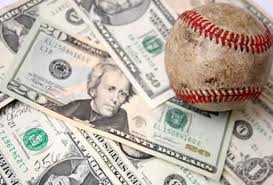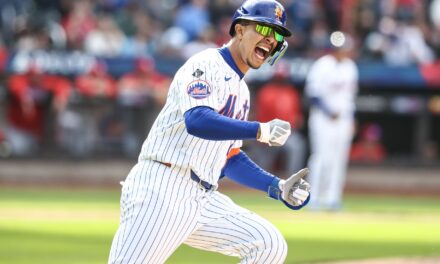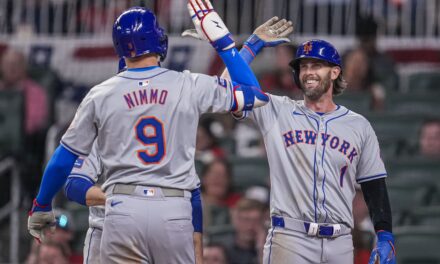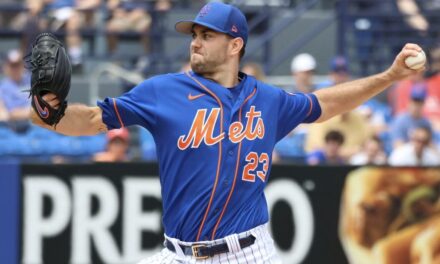There is this idea that gets floated around every winter that if you do not sign top free agents, you’re punting the off-season or playing (wait for it) “moneyball.”
In most instances, a free agent hits the market toward the end of his prime years. You’re purchasing an unknown commodity that is likely overpriced and will depreciate the second the deal is done.
There’s no doubt in my mind that free agent signings play a key role in completing a team. However, what I stand firm on is that you do not build a team through free agency. More and more we’re seeing teams lock up their young talent until their early 30’s. Why is that?
The homegrown team wants to get the most bang for their buck. A player (generally speaking) is at their best prior to 31, 32 years old. There’s always going to be instances when you extend homegrown talent past that age. David Wright isn’t the first guy to get a contract that will take him past his prime years.
But what about free agency? I think at times people mistake the lack of interest in spending money on free agents for a desire to not spend any money. That’s not the case at all. If you have $100 million to spend, why do you have to spend it all on aging players?
Why can’t some of that money get invested into the minor leagues, development, scouting and the international market? The problem for executives is that fans can actually see the money being spent when it’s spent on the open market. They cannot see it when it’s invested in the international market until many years down the road.
I wanted to see the success rate of multi-year free agents so I went back to the pre-07 season and focused on the next 5 years. We’ll use ESPN’s Top 50 Free Agents as our research tool.
To take it 1 step further, we will eliminate any player who re-signed with his former team. So yes, this lets GM’s off the hook who may or may not have signed a lefty with control problems.
Finally, as stated above, I’m looking at multi-year deals only.
So we’re talking about roughly $3.2 billion guaranteed to 86 players. So did it pay off?
How do you measure whether a free agents contract paid off or not? Team performance better than the year prior? Overall performance at the level it was prior to the contract? Making the playoffs? I know there are some statistics out there that say a player’s performance was worth X. Frankly, I hardly ever see a player’s performance worth what they are paid.
It’s a very tough measurement because you have to decide what you’re willing to give up for immediate success. For example, Alfonso Soriano signed an 8 year deal. For the first two years of that deal, the Cubs made the playoffs – yet they haven’t since. Also it seems like the Cubs are always in the business of trying to dump him. So, I can’t really say that deal paid off.
If I were to look at the 86 players honestly, I’d say the only ones I wouldn’t be upset about as a fan of that team would be:
Daisuke Matsuzaka ($52m/6yrs with Boston) – Even though it didn’t end well at all, it was a shot worth taking. His 2007 and 2008 seasons were very good, and he pitched in the World Series for the Red Sox. Dice K finished Top 5 in the Cy Young in 2008.
J.D. Drew ($70m/5yrs with Boston) – Again, Drew was on a championship team and filled an outfield need adequately for the majority of his contract.
Torii Hunter ($90m/5 years with LAA) – Hunter became a clubhouse leader in Anaheim and performed to expectations throughout his contract.
Mark Teixeira ($180m/8yrs with NYY) – They won a World Series, and he’s one of the best 1B in the game.
C.C. Sabathia ($161m/7yrs with NYY) – Though he opted out to get more money, the Yankees still got the ace they needed to win a title.
Derek Lowe ($60m/4yrs with ATL) – The end wasn’t pretty but when you compare him to Oliver Perez it just goes to show you how good of a signing this was. Lowe won 31 games in his first two years of this deal.
Adam Dunn ($20m/2yrs with WSH) – An average of 38HR with 104 RBI gets you on this list.
Francisco Cordero ($46m/4yrs with CIN) – Gave them a legitimate closer during the length of his deal before getting dealt in the final year.
Francisco Rodriguez ($37m/3yrs with NYM) – Obviously the vesting option could have drastically altered my view of this deal. While K-Rod gave many heart attacks, he was worth getting.
Jeremy Affeldt ($8m/2yrs with SF) – Has become a top reliever in the game.
Edgar Renteria ($18.5m/2yrs with SF) – Tough to leave a World Series MVP off this list.
Raul Ibanez ($31.5m/3yrs with PHI) – He wasn’t brilliant but his .798 OPS at his age proved adequate for what Philadelphia needed out of LF.
Aroldis Chapman ($30.25m/6yrs with CIN) – I don’t think I need to explain.
Randy Wolf ($29.75m/3yrs with MIL) – He was released in the final year of his contract but in the first two he went 26-22 with a 3.93 ERA in 67 starts.
Jose Valverde ($14m/2yrs with DET) – He re-upped after the 2011 year, and while that turned out to be a disaster, he was still one of the best closers during the first two years.
Cliff Lee ($120m/5yrs with PHI) – You know, this contract still hasn’t brought Philadelphia the 2nd title they desperately wanted, but it’s hard for me to say this wasn’t a good idea.
Adrian Beltre ($96m/6yrs with TEX) – Still one of the best 3B in the league.
Victor Martinez ($50m/4yrs with DET) – The forgotten Tiger. I’m giving him the benefit of the doubt right now because his 2011 season was very good.
Rafael Soriano ($35m/2yrs with NYY) – Essentially this move saved their 2012 season.
J.J. Putz ($10m/2yrs with ARI) – Sure wasn’t the Putz we saw here in New York. 117 appearances with a 2.48 ERA and 77 Saves.
The contracts not worth the money or years have high profile names like Crawford, Soriano, Zito, Lee, Burnett, Lackey and yes of course, Jason Bay. Combined that’s $735million.
Overall, I found 20 multi-year free agent deals that I’d have a hard time labeling as anything but a good idea. That leaves 66 players who signed multi-year deals where the negative outweighs any positive they bring to the table. That’s just over $2billion that could have been spent elsewhere.
So while free agents represent something shiny and new for teams and fans, they are far from a guarantee.
The game is changing into a game played by younger players. Buying aging talent on an open market no longer appears to be the answer when trying to build your team back up to a respectable level.
All free agency does is give fans and teams a quick fix, while in most cases ignoring the bigger picture until the hole you’ve dug yourself in is so great, that you’re trading a reigning Cy Young winner.














